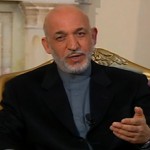 Joshua Landis has a complementary (and complimentary) perspective on Tisdall's analysis on Syria Comment.
Joshua Landis has a complementary (and complimentary) perspective on Tisdall's analysis on Syria Comment.Simon Tisdall, writing in
The Guardian of London on Monday,
offered a valuable analysis of the recent dynamics surrounding US-Syrian relations and events in the Middle East. Tisdall noted (rightly, in my opinion) the "realist" outlook of Obama and Co. and suggested that "improved US relations with Syria could hold the key" three vital issues: avoidance of military confrontation with Iran, management of the Iraq withdrawal, "and some kind of half-credible peace process between Israel and its Arab neighbours". He supported this reading with the signals of engagement: Syrian President Bashir al-Assad's interviews welcoming a US "re-entry" into the Middle East peace process, Senator John Kerry's visit to Damascus last week, and conciliatory words from Arab states such as Saudi Arabia.
What can and should be added to Tisdall's analysis are the recent events that have not only promoted this engagement but strengthened Syria's position in negotiations. In December 2008, the foundations for direct Israel-Syria talks had been laid but the wider context for the diplomacy was still the call for Damascus to end its support of groups such as Hezbollah and Hamas and to limit, if not cut, its ties with Iran.
Then the Olmert Government decided to gamble with the invasion of Gaza. The direct talks with Syria were suspended of course, alienating Turkey in the process, as Tel Aviv effectively hand-in-hand with Egypt and probably Saudi Arabia on the challenge to Hamas.
The significance was not only that this challenge failed but that it spurred a re-alignment which put Syria in the Middle Eastern ascendancy. By giving vocal and visible support to Hamas, Assad set himself up as the defender of Arab resistance to Israeli aggression, a position buttressed by the damage to Egypt's reputation. With Turkey and Iran recognising that position, as they quickly sent representatives to Damascus, and with platforms such as the Qatar Summit, the Syrians could look to a reconfigured diplomatic scene in the aftermath of Gaza.
Few have noted, for example, that there is no more talk of bringing Syrian leaders to account for the assassination of Lebanese Prime Minister Rafiq al-Hariri in 2005. It is also notable that no one, especially the US, is making a fuss about the alleged Syrian nuclear facility destroyed by Israel in October 2007, even though an International Atomic Energy Agency report last week pointed to the presence of uranium.
Instead, renewed Israeli-Syrian talks are being pursued so vigorously that Uzi Mahnaimi, who should be considered more a conduit for the Israeli military and intelligence services than a journalist for The Sunday Times,
is writing: "Reports compiled by Mossad, the overseas spy agency, and by military intelligence, that strongly advocate opening negotiations with President Bashar al-Assad of Syria."
Which brings us back to the wider of the Damascene conversion of Gaza into a re-aligned position not only on its direct relations with Tel Aviv but on relations with Hamas, Hezbollah, and Tehran. Tisdall sees a trade-off: a new Israeli Government will have to engage in meaningful talks with Syria to maintain its isolation of Hamas: "If, as seems likely, [Benjamin Netanyahu] obstructs the Palestinian track, the Likud leader may have to give ground elsewhere, literally."
That might have been possible up to December, but no longer. Syria now has the cards for its territorial aims vis-a-vis Israel but for an inclusion of Hamas in the discussions on Palestine. The attempt to curb Hezbollah through talks with Damascus, which always was a curious exercise mssing the complexities of Lebanese politics and society, will now be kicked into touch. And the breaking of a supposed Syria-Iran axis is now less likelu than a dynamic in which engagement with both Damascus and Tehran takes place.
In 2003, chatter in Washington was "Baghdad, Then Turn Left". That thought of rolliing regime change can now be consigned to the dustbin of George W. Bush's history. It's envoys, not tanks, that are the talismen of this New Middle East Order.
 Wednesday, February 25, 2009 at 7:21
Wednesday, February 25, 2009 at 7:21  Hours after we posted an analysis of Washington's engagement with Syria, the story started fluttering across the Internet that Damascus had built a missile facility on the site of the alleged nuclear plant bombed by Israel in October 2007.
Hours after we posted an analysis of Washington's engagement with Syria, the story started fluttering across the Internet that Damascus had built a missile facility on the site of the alleged nuclear plant bombed by Israel in October 2007.
 Joshua Landis has a complementary (and complimentary) perspective on Tisdall's analysis
Joshua Landis has a complementary (and complimentary) perspective on Tisdall's analysis 


